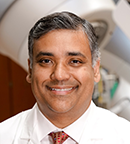Patients who were unexpectedly hospitalized for dehydration, fever, or other events while undergoing radiotherapy for head and neck cancer were at a higher risk for less favorable outcomes, according to a study published by Anurag K. Singh, MD, and colleagues in Oral Oncology.

Anurag K. Singh, MD
Researchers found that those patients receiving radiotherapy for their cancer were at a higher risk of being unexpectedly hospitalized for fever and/or dehydration either during treatment or within 90 days of receiving radiation were at higher risk of death. It was also found that patients who were older, had advanced stage tumors, who were currently smoking, and/or who were reliant on nutritional support were more likely to have less favorable overall survival and cancer-specific survival rates than those who completed their treatment and had adequate nutrition and hydration.
“While the trends we found are concerning, they highlight an important clinical indicator that has not received enough attention and opportunities for improving both health and quality of life for our patients,” said Dr. Singh, Director of Radiation Research and Professor of Oncology within the Department of Radiation Medicine and Leader of the Cell Stress and Biophysical Therapy Program at Roswell Park.
More Key Findings
Of the 839 patients whose experiences were studied in this retroactive analysis based on data collected at Roswell Park between 2003 and 2017, 171 (20%) were hospitalized at least once after receiving radiotherapy for their cancer within 90 days of their initial treatment.
While the percentage of hospitalized patients was much lower than expected, the investigators noted that clinical outcomes were significantly better in patients who did not require unexpected hospitalization. The average overall survival rate at 5 years was 46% for people who had been unexpectedly hospitalized and 60.4% for those who did not require hospitalization; cancer-specific survival at 5 years was 58.3% for those who were hospitalized compared to 70.1% for those who were not.
KEY POINTS
- The average overall survival rate at 5 years was 46% for people who had been unexpectedly hospitalized and 60.4% for those who did not require hospitalization.
- Cancer-specific survival at 5 years was 58.3% for those who were hospitalized compared to 70.1% for those who were not.
The results point to the need for good hydration for patients, and the need for clinical teams to regularly monitor and check in on their patient’s overall health, said Dr. Singh. “Providers need to see the patients as frequently as they need to be seen, not just once a week.”
The team also found that patients who completed their course of radiotherapy had better overall survival and cancer-specific survival rates than those patients who did not, and their complete response to treatment was better overall than those patients who had to cut their treatment short.
“This research changes how we understand interventions during radiation,” noted Dr. Singh. “Based on these findings, we will continue to focus on improving pain control and hydration and [on] ways we can help make our patients fitter and more resilient with exercise for both health maintenance and improved quality of life.”
Dr. Singh encourages further and broader research on the significance of hospitalizations as a clinical indicator, as a multisite study may show even more pronounced associations between hospitalizations and less-favorable outcomes.
The study authors concluded, “This study reveals significantly worse overall survival and cancer-specific survival for patients hospitalized during radiotherapy for head and neck cancer. Hospitalization may be an early marker for worse survival.”
Disclosure: This work was funded in part by Roswell Park’s Core Grant from the National Cancer Institute. For full disclosures of the study authors, visit sciencedirect.com.

